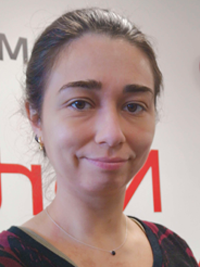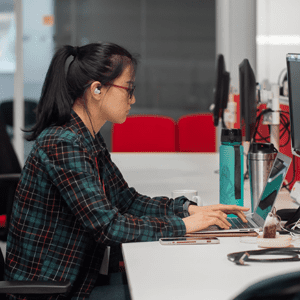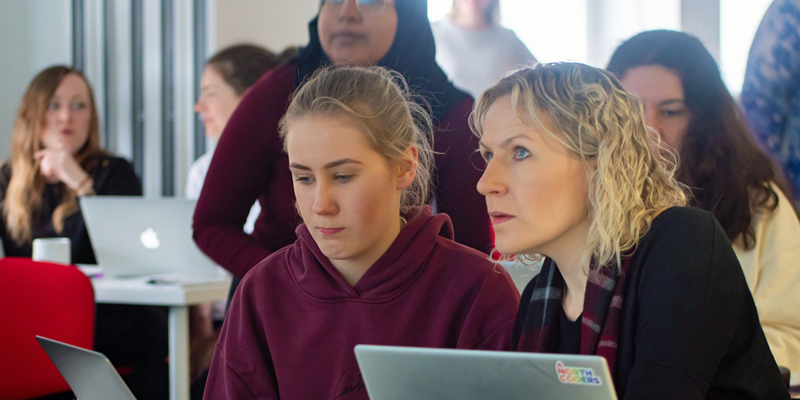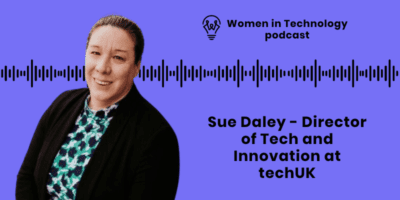Born in Bulgaria, Vel Georgieva came to the UK in 2009 to study for a degree in Graphics for Games at the University of Bradford, before completing a Master of Science in Creative Technology at Leeds Beckett University. In 2017 she became a self-taught web developer, having built up her knowledge and experience in front-end web development, using a range of online tools to teach herself CSS, JS and React, as well as gaining some back-end development in Express and Node.js. In 2018, Vel enrolled on a Northcoders bootcamp, training to be a developer and enjoying it so much so ended up joining the organisation as a trainer and mentor, working her way up to her current role as software engineer and head of mentoring.

“Funding has really opened the doors for a lot of people, not only women and people from underrepresented gender minorities, but also people from different social standings and people from different cultural backgrounds.”
From Bulgaria to Bradford, and then Leeds
I come from Bulgaria and I spent my school years in Bulgaria, before I moved to the UK for my higher education. I did a BA in Graphics for Video Games at the University of Bradford. It was tech adjacent, but more on the periphery, so I decided to get more hands-on.
I then did my Master’s degree at Leeds Beckett University in creative technologies, so looking at the artistic side, using tools rather than writing them and building them. There was a little bit of coding involved in many of my modules and I surprised myself when I found I quite enjoyed it. I remember thinking beforehand that coding wasn’t for me — boring, stripped of emotion and not like anything that I enjoyed at the time, but eventually my opinion shifted.
Loving the logic of coding
Post-university I had to find employment, and what I found was working in customer services, in a couple of call centres. It started off as being ‘just for six months’, and then ‘just for the year’. But then it turned out to be a couple of years and then a few years, and I decided it was time to re-evaluate things and reconsider what I was doing.
Working in a call centre environment was a very character-building experience. It taught me so much about the world of employment, and helped me develop a lot of soft skills, and human skills, because I had to deal with people both on the phone and also with my colleagues in person.
Much of the work I did there was actually quite transferrable — now I’m in the world of coding, my experience of working in a complaints department helps me as there was a lot of problem-solving, a lot of managing expectations. I could be speaking to people who were perhaps a little bit upset, which helped me learn to stay calm under pressure.
At this point, I decided to take a career break, and I tried learning coding on my own. My partner had similarly transitioned into coding and he said: “You’re going to love it. Trust me. You are so logical and you have a head for this.” I didn’t believe him for the longest time but then we did some of the free online courses together and I realised he was right and I absolutely loved it!
I suddenly began to appreciate the logic, the structure, and all of the things that I thought I would dislike. I really appreciated it because it wasn’t speaking to people who could give you any number of answers. It was a program that you’d told you exactly what to do and if the program didn’t do the things you wanted it was because of your instructions.
I found that quite reassuring, so I started looking around. I did a bit of self-study for about six to eight months. I started actively looking for jobs but I wasn’t really getting anywhere. I was getting interviews but it was mostly for building template sites, building email templating and things like that. I wanted something more creative. I wanted something that would be more challenging where I could put this coding logic and the coding skills that I was developing into actual practice. (Not that the template building can’t offer that to an extent, I just wanted more.)
Nurtured by Northcoders
As part of my job search, I went to a job fair in Leeds where I visited Northcoder’s stall as I saw they were offering career support. I completed the entry challenge and then my mum helped me out with sponsorship because it was a three-month bootcamp, as it is now, and a full time course can take a lot out of you.
Some of our students try to work part time or maybe fit in the bootcamp with other obligations, but really it is the start of a new career so it is full time, hours and full time engagement. It can be quite tiring being delivered new content and practicing it constantly.
When I joined Northcoders, I got one of the scholarships we had at the time for women in tech and I was very grateful for it because otherwise, I’m not sure I would’ve been able to fund myself at that time. This was when we only had a branch in Manchester, so I travelled from Leeds on a daily basis.
I don’t know how I did it now, but back then I was thriving off it. I was really motivated because I was suddenly surrounded by like-minded people. When I took my career break, I had mostly been at home on my own, so it was wonderful being back with people again and being in this really supportive environment.
The tutors really wanted to help out, sitting with you and spending time with you. I already had a common interest with my peers, we even had a common language whilst we were learning. There were so many opportunities for coding-based discussion.
Without the community around the bootcamp, I don’t think I would’ve learned as quickly, or as well as I did at the time. I really appreciated the content being taught. In my six to eight months of previously studying by myself online, I thought I’d covered quite a lot of ground but there was so much more in the wider world than is available through online resources. I found that being able to interrupt and ask questions to get answers then and there to the things that were bothering me was invaluable.
Keeping my bubble from bursting
I didn’t want it to come to an end and I was preparing myself to go back to job search. It was at this point they told me they were hiring and so I decided to apply. I did an interview and a tech test with them, so I thought: “Even if I don’t get it, it’s still a tech test under my belt.” It was then they offered me a role as a mentor. When I got the job, I was so happy. It was like the bubble that I was in didn’t actually have to burst!
I continued to commute to Manchester for another six months before we finally opened our Leeds office. We were finding that a lot of people were making the journey across the Pennine and we decided to make the bootcamps more accessible for our customers.
At the same time, we were building up a bank of tutors in Leeds and I was delivering some of the content, not just supporting the students. I got into more of the managerial side of things, sorting things out around the office, doing a little bit of administration — student passes, that type of thing. Who’s covering this lecture? Who’s covering that lecture? At the time there were so few of us that everyone really chipped in.
This shared responsibility between the team worked fairly organically until we started to ramp up staff numbers, but also until the pandemic hit when we were forced to pivot from a fully in-person experience into a fully remote experience, which was a steep learning curve for us. We had a team in Manchester and a team in Leeds but we worked as a united front, which had a ton of benefits for everyone on the team.
We now offer a mixture of remote and in-person learning. We still have our core managed offices in Manchester and Leeds, but we also have smaller hubs in Birmingham and Newcastle. During this process I also got promoted to head of classroom alongside one of my colleagues, Paul Rogerson, who works in Manchester.
The two of us keep track of things. My role is mostly managerial at present, but I do have a little bit of coding time too.
Tech bootcamps giving career changers choices

Over the years, that mission really has remained the same — to break down the barriers for people joining the tech industry, and part of that was breaking down barriers specifically around gender minorities in the tech industry, but also for other people who are underrepresented in tech.
The company’s core product is our software engineering bootcamp, which lasts for 13 weeks and runs throughout the year. At beginning of this year, we started offering two alternative variants — data engineering. cloud engineering. As they are newer programmes, they’re under a fair bit of revision. It’s vital that we keep on top of current industry trends. We always make sure our products go through a few iterations.
To help students make this important choice between pathways our website provides an overview of what each path really offers, and the first few weeks of all the boot camps that I mentioned are the same because we build upon the foundation, so JavaScript is a language, and from there on we diverge into the more specialised areas.
Between these different tracks, there’s overlap in terms of problem-solving, learning to actually code, being able to analyse, being able to debug, to test. There are foundational skills in all of them that you can take and transition into anything. We’ve had people from the software engineering bootcamp go into both data, cloud and testing, and all sorts of front-end, back-end roles, mobile development, and so many different areas.
Usually, people have a little bit of an idea of where they see themselves if they’ve been drawn to a particular path. People who have done analytics before might look more into the data side of stuff. Sometimes people have had different experiences with coding on their own and they want to use this as an opportunity to step up.
They might look into cloud engineering, or there are people who say: “I want to do mobile development” or “I want to do web development. I have this plan for an application that I want to build for this company I want to start.” For them, we have opportunities for this discussion where people can ask questions and we can direct them on that path. There are open evenings where people can come and have a chat with our onboarding team and to a couple of the tutors so they can get answers to their questions.
To fund the bootcamps we secure funding from the Government so we can make them accessible for a huge variety of people who wouldn’t have previously have been able to take part. There are certain geographical boundaries but there’s also some room to negotiate too. For example, if we have a waiting list of students within the Newcastle area, we can ask for more funding for there.
A day in the life of a tech bootcamp
For the bootcamps the day starts at 8 45am but we ask people to be available from 8.30am to make sure that everyone is ready to get started on the dot at 8 45. So, for about an hour we have a lecture introducing a new concept at a higher level, so, for example, this could be front-end accessibility, or it could be how front-end application routing works, or more on the fundamentals side, how do different data types work? If it’s more of the fundamental sections, then that is followed up by a seminar, which shows the practical side of things.
Recently our cohorts have been quite large, usually around a hundred people, so then we break into smaller seminar groups, which are roughly around 30 people. After the lecture, there is a seminar and this is the students’ opportunity to ask questions and get answers to these. In the sessions we might run through the practical side of some code, having discussed the abstract concept in the lecture.
Content is delivered through Zoom so that we can cater to our remote learners. Even the people who attend in the office tune into the Zoom lecture and then we have ‘sprints’ designed for them (where they follow a set of instructions that are phrased as client requirements), or they work on a project for that day, or a couple of days. They could either be doing that in pairs or solo.
When people are in pairs, we try to group remote people with other remote people, people in the Manchester office with other Manchester office people, people in the Leeds office with other people in the Leeds office, and so on and so forth.
For the rest of the day, they work in that format but if they get stuck with anything they can send a request to us. At this stage, a tutor comes and checks in with them, tries to get them unstuck, tries to explain a little bit about why they’re facing that decision in the first place. So, it’s not just about, “Oh, fix my issue”. It’s “Let’s discuss”.
We have regular check-ins with students on a more pastoral level too. The pace of the bootcamps is quite rapid. Every day, if not every other day, we change topics and we throw in new things and some students can find this quite challenging. Coding isn’t necessarily easy so we make sure everyone knows it’s totally OK to get stuck and ask for help.
We are exposing people at pace and to the problem-solving and debugging techniques they’ll have to get to grips with in their day-to-day jobs. So, it’s practice-based and as close as possible to learning on the job.
Getting ready for the real world
During the last three weeks of the course there are no taught lectures and the students learn about the practicalities of working in a group. They come up with their own project idea and they built it, which is their final project that they can put in front of employers to show they can work as part of a team.
Now, as the course does move quite rapidly and sometimes people need a couple of more weeks afterward to revisit their learning materials and build up their portfolio pieces in their own time, but that’s totally OK.
This is where our partnerships and careers team work alongside companies to nurture great relationships with employers. They are constantly talking with different companies to find out what they need in order to support our students so they know what they can expect from our graduates. We build lasting relationships with our clients and we have many companies who hire from us again and again because our graduates already have solid practical experience by the time they leave us.
In terms of opportunities, we also encourage graduates to look beyond our jobs board as well. Any interviews and tech tests are good if you can learn something from them. The onus is on our graduates pursuing that career for themselves, not for us to do it for them. They have to be active and participate, but we offer whatever support they need.
We have had a variety of people go into mobile development, we’ve had a variety of people go into more front-end roles and into full stack. There’s been people who’ve worked for British companies but also some for international companies. There really has been a vast array of opportunities in large and small organisations.
🌟Hats off to our January cohort for graduating today!🎓🎉 Your hard work, dedication and perseverance has paid off! Best wishes for a bright future in your new careers in tech!🌟 pic.twitter.com/gIRMdqAL4B
— Northcoders (@northcoders) April 6, 2023
Inclusion is integral
Ensuring we’re as inclusive as possible is a widely discussed topic within the team and within the different departments. Even before we start the bootcamps we offer drop-in sessions entirely free of charge. One of them each week is catered to women and gender minorities. We keep this session as a safe space so they have the opportunity to ask questions.
We try to hire diversely as well and between the different departments we have a good mix when it comes to gender split. We’re doing more work to build our representation of different races and beliefs in other areas as well.
As well as this, we have recently acquired another company called Tech Returners. They offer their own tailored programmes for people who already are part of the tech industry and who are already developers and have taken an employment break for whatever reason. Colleagues do a very good job of equipping those people with the skills that they need to re-enter the workforce.
Many of their students are women taking employment breaks to have children, but there’s lots of other people who benefit from being able to have a more of a dedicated course to help them transition back into the workplace – it could be people who’ve taken a break due to illness, or for caring responsibilities, for example. There’s all manner of different reasons.
Funding has really opened the doors for a lot of people, not only women and people from underrepresented gender minorities but also people from different social standings and people from different cultural backgrounds. We have noticed a marked increase in diversity in those two areas. This could be people who haven’t pursued A-levels or higher education, or people who have previously been in another type of employment.
Coming up next
Work-wise, for the next few weeks, I’m attached to one of the cohorts so I am more involved in lecture delivery. I’m loving being part of the teaching process and supporting students on the frontline a little bit more. I’m also looking forward to having a couple more opportunities to get involved in our internal development team later in the year.
Personal-wise, I’ve got a holiday to Finland coming up in June, visiting a very good friend of mine, so I am very excited for my Finnish adventure!





